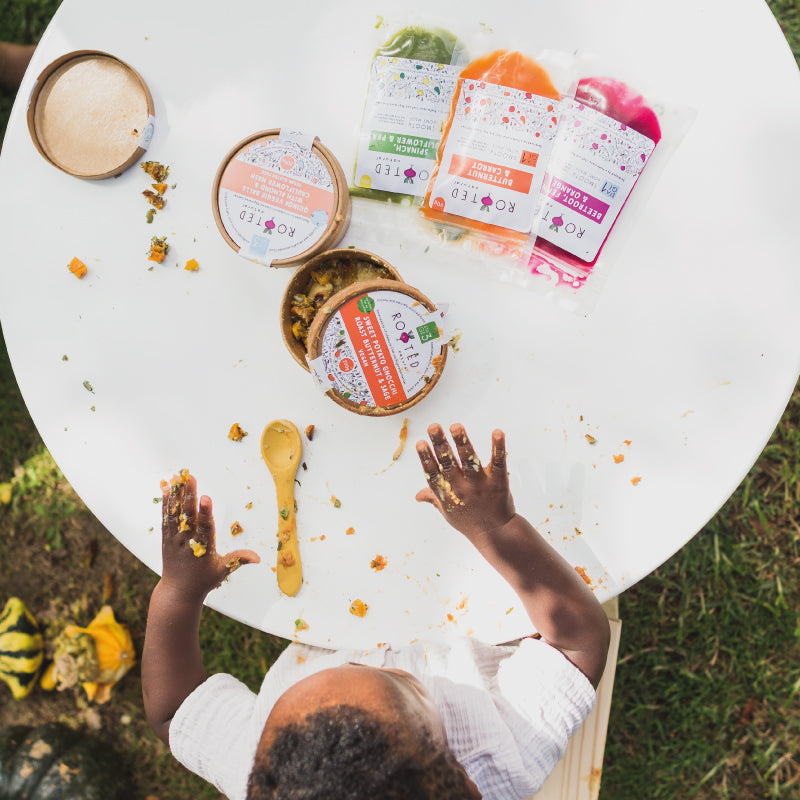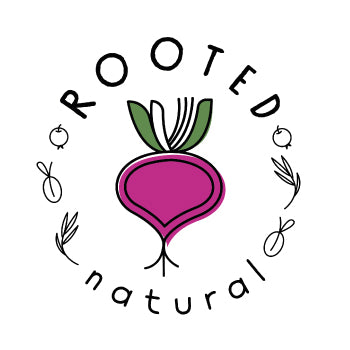Your Cart is Empty
Buy Now

Starting solids… where does the milkfeed fit?
November 16, 2022 5 min read

Infants between four and six months are developmentally and emotionally ready to acquire a skill called eating. They also learn more about flavours and textures that food brings. Their level of activity increases, as well as nutritional needs to contribute to optimise growth and brain development. This being said, introduction of solids stays COMPLIMENTARY to breastfeeding for the first year of life. You have roughly 6 months to ease into eating – hence why this is so important to go according to your little one’s pace, follow their cues and continue breastfeeding.

Your infant is ready to start exploring with food when -
- showing an interest in food by grabbing, sucking on lips or opening his/her mouth when food is nearby
- can sit with minimum support and have head control
The correct food, timing and approach when introducing solids helps prevent allergies, picky eaters, childhood obesity and micronutrient deficiencies that are crucial to brain and motor development.

Fact: My little one’s gut is mature enough for solid food between 4 and 6 months of age.
Physiologically the intestinal tract is still somewhat permeable before 4 months of age. This means the lining, made up of cells called enterocytes, still form protein complex connections called junctions. These enterocytes and junctions work together to ensure correct absorption of nutrients. Breastmilk helps to mature the gut through the oligosaccharides and immunoglobins. Oligosaccharides are natural prebiotics that encourage healthy growth of gut bacteria. Immunoglobulins, specifically IgA is a protective antibody that protect against microbial infection – preventing diarrhoea and respiratory tract infections. Before 4 to 6 months the gut cannot absorb these more complex nutrients from solids food yet, and is irritated. Early introduction of solids (before 4 months) can lead to gastro-intestinal symptoms such as diarrhoea and increase the possibility to develop allergies. Whereas, delayed introduction may lead to deficiencies and tactile difficulties to accept a different mode of feeding.

Myth: Solids will improve my babies sleep and replace breastfeeding from 6 months onwards.
Babies breastfeed more for various reasons, and their milk intake will only really start decreasing when they are on three solid meals per day. And this will still be influenced by teething, illness and growth spurts. Specific foods and nutrients do not improve sleep, however a well-balanced intake, together with following your little one’s cues and emotional connection are key to improving sleep.

Myth: I can start to skip breastfeeding times as soon as my little one start on solids
Breastmilk is still the foundation of your little ones intake for the first 12 months of life. It ensures your baby will get all the nutrients throughout each milestone and teething episode. Do not hurry to stop breastfeeding or skip a milk feed until your little one indicates he/she is ready to do so repeatedly (at least three consecutive days)
Remember, it is journey not a destination - it should be a fun experience for the parent and infant and he/she is still getting the bulk of their needs from their breastmilk feeds.
Blog post written by Nadia J van Rensburg, RD(SA);
Rooted Natural, Co-founder

Parenting in today’s modern world can be overwhelming, due to the increasing demands on one’s time and energy, leaving not much room for making or researching homemade, nutritious meals for the little one.
We think healthy children make happy children and what better way to achieve both than through providing specially-crafted delicious, nourishing meals.
We promote the growth of infants and young children by establishing a healthy complementary food intake through providing already-made, home-cooked and naturally-sourced meals for every stage of their development.
Building the trust of a parent is important to us, as is connecting with local farmers, produce and suppliers.


Rooted Natural is the brainchild of Kirby van Rooyen and Nadia Jansen van Rensburg - two South African women with a passion for food and nutrition, who have realised how important it is to establish a healthy relationship with food from the first introduction.
Through their knowledge and expertise as a professional chef and registered dietitian, they recognise the need for locally-produced, organic baby and toddler food. Food that is affordable and includes a wider variety of tastes and textures that is also earth-friendly.
Kirby has worked as both a professional chef in the fine dining world for the likes of Test Kitchen, as well as a private chef for notable personalities globally. Through her many years of experience, Kirby has become conscious about the planet, sustainability, and what we can do to make the world a better place. Her love of children and large family background have made Kirby passionate about creating tasty, healthy meals for all ages. Kirby wishes she had had an introduction to a variety of flavours at a young age just like what Rooted Natural provides.
Nadia has ten years of experience as a clinical dietitian under belt that included being a Chief Dietitian at Groote Schuur Hospital, a Masters in Human Nutrition and a special interest in paediatric nutrition. She is incredibly passionate about promoting a healthy relationship with food and taking care of the environment by making more conscious daily food choices. Nadia’s biggest achievement by far has been bringing two healthy and busy children into the world and the joy (as well as challenges) of motherhood. Nadia hopes that Rooted Natural can be the foundation for a balanced and healthy food experience for all infants and children as well as bring peace of mind to parents.
 We love supporting local mamma's who are custodians for breastfeeding, so please follow and support the wonderful women behind Rooted Natural
We love supporting local mamma's who are custodians for breastfeeding, so please follow and support the wonderful women behind Rooted Natural
References:
Agostoni, C. et al. Complementary feeding: a commentary by the ESPGHAN Committee on Nutrition. J. Pediatr. Gastroenterol. Nutr. 46, 99–110 (2008)
Battersby, A. J. & Gibbons, D. L. The gut mucosal immune system in the neonatal period. Pediatr. Allergy Immunol. 24, 414–421 (2013).
Odenwald, M. A. & Turner, J. R. Intestinal permeability defects: is it time to treat? Clin. Gastroenterol. Hepatol. Off. Clin. Pract. J. Am. Gastroenterol. Assoc. 11, 1075–1083 (2013).
Turati, F. et al. Early weaning is beneficial to prevent atopic dermatitis occurrence in young children. Allergy (2016).
Koplin JJ, Osborne J, Wake M, Martin PE, Gurrin L, Robinson MN, Tey D, Slaa M, Thiele L, Miles L, Anderson D, Tan T, Hill DJ, Lowe AJ, Matheson MC, Ponsonby A, Tanh MLK, Dharmage SC, Allen KJ. Can early introduction of egg prevent egg allergy in infants? A population-based study. J All Clin Imm. 2010, Oct;126(4): 807-13.
Pearce J, Taylor MA, Langley-Evans SC. Timing of the introduction of complementary feeding and risk of childhood obesity: a systematic review. Int J Obes. 2013, Oct; 37(10): 1295-306.
Subscribe
Sign up to get the latest on sales, new releases and more …












